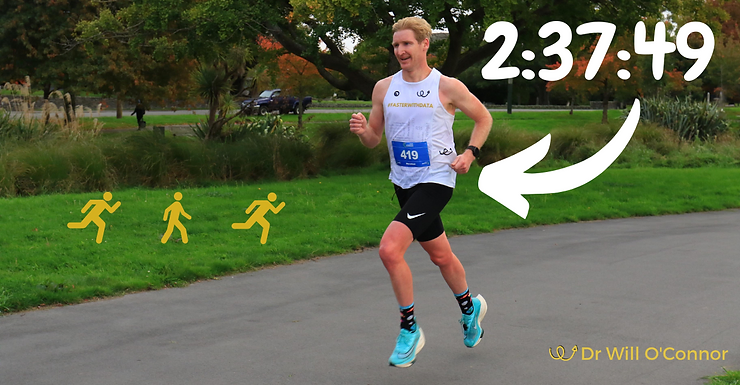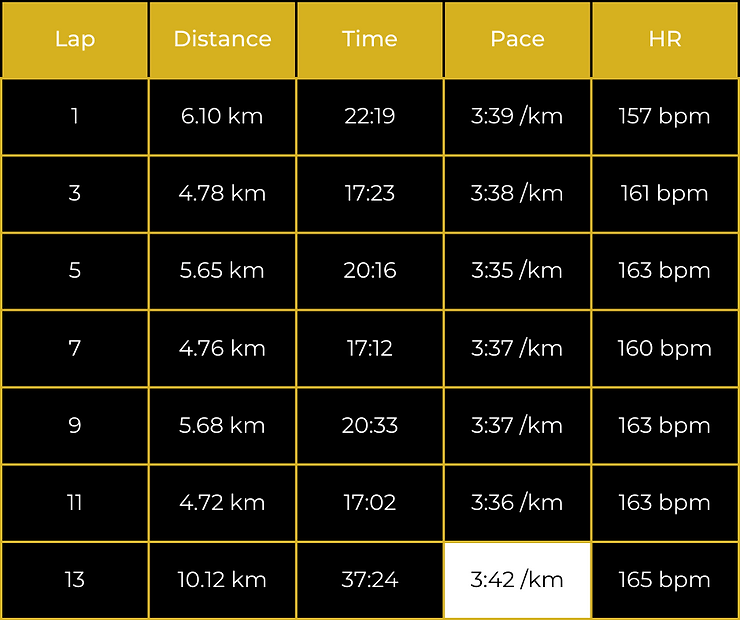
I used my run-walk marathon method to finish in 2:37:49 at the Christchurch Marathon. An outright marathon PB for me. In part one, I wrote all about the theory behind the run-walk, so here I’ll stick to my thoughts on how I was able run my fastest marathon by walking for 6 minutes, and how run-walk might be the ticket to your next marathon PB.
“Imagine how fast you would’ve run if you didn’t walk!” I’ve had that comment a lot since posting my result from Sunday.
The thing is, I’m not losing time by walking. I’m conserving energy. Time is constant. You can’t save time or lose time. Time is never in your control. However, energy is controllable. You can store it, spend it, or transfer it. When you’re running a marathon, the key variable you have to control is your energy output.
Let’s say I didn’t walk. How much faster could I have gone? Could I remove the additional 3:52 sec (5.5 sec/km) I “lost” because I walked? That would give me a finish time of 2:33:57 (3:39min/km or 5:52min/mi).
Hard to say, but I think not. As I concluded after my initial run-walk experiment, I don’t believe run-walk is a method to outperform your potential. Rather, run-walk is a safety protocol that minimises you’re potential to run too fast at the start avoiding a blow-up before the end.
If energy output rather than time (or pace) is the key variable in marathon performance, then we ought to look at the maximal potential energy output across the 42.2 km rather than the maximal sustainable pace, which is a product of your energy usage.
Using my example from the weekend. My Coros Apex 2 Pro told me that I burnt 3005 calories (kcals) during the marathon. If 3000 kcal (rounding down) is my maximal energy output for 42.2km, I just need to figure out how to spend those 3000 calories most efficiently. Is running and walking the most efficient way to burn my 3000 kcal over 42.2km? Or is running a couple of seconds slower without any walking breaks more efficient? Keep in mind that I only “lost” 5.5sec/km to walking. Do you think running 3 sec/km slower without walking for 6 minutes is a more efficient way to spend my marathon energy? Possibly, but it sure sounds like a risky way to gain 1:46 min!
While the method is simple, run and walk, the concept that walking could allow for faster marathon times is difficult. When I consider a runner’s energy expenditure, running economy, glycogen usage, neural signaling, hydration, nutrition and core temperature, rather than simply what pace will equal what finishing time, it leads me to think, maybe there are a few different ways to ‘run’ a marathon.
As I discussed with Dr Matt Miller on the Performance Advantage Podcast, could Kipchoge have run faster than 1:59 if he walked for 1-2 min at half way? Would 2 min of walking have allowed him a greater output over the final 21 km? Sure, you can look at the simple math of how much faster he’d need to run to account for the walking, but the more complex equation of what he would gain/lose physiologically is the more important one.
Performance Advantage Podcast Episode HERE
Running with Dr Will Episode – Apple, Spotify, Google
If you look at my running splits from the race, my slowest split was the final 10 km in which I didn’t walk. I was, on average, 5 sec/km slower over the last 10 km, which means I “lost” just under a minute compared to my average running pace for the prior 32 km. Maybe I would have been better off adding another 1 min walking break…

My Challenge For You. Just Try It.
If run-walk interests you, I challenge you to do two or three of your training runs as run-walk. Run 14 min – Walk 1 min. As easy as that. Once you realise your average pace isn’t any slower than your regular run, you can try run-walk in your bigger workouts. And maybe, your next marathon!!! On multiple occasions, I’ve proved run-walk isn’t going to result in embarrassingly slow times, and it might be the ‘new way’ to complete a marathon. I’ve put together a run-walk training bundle with six training plans and a webinar for $49nzd. I am selling one of these training plans for $59usd on TrainingPeaks, so it’s a killer deal.
Enjoy your next run-walk 😏
All the best,
Dr Will
Running scientist 🧑🔬
- 2023 “Running with Dr Will” Run-Walk Podcast (Part One) – Apple, Spotify, Google
- Original Run-Walk Blog – https://www.drwilloconnor.com/post/can-i-run-walk-a-sub-2-40-marathon
- Post Run-Walk Marathon Experiment Blog – https://www.drwilloconnor.com/post/how-i-used-the-run-walk-method-to-run-2hrs-45min
- Run-Walk Experiment Results Video – Run-Walk Marathon Method Vs Running Non-stop
- Performance Advantage Podcast Run-Walk Episode – https://spotifyanchor-web.app.link/e/4vaH2K2jXyb
- Performance Advantage Podcast Run-Walk Video – https://www.youtube.com/watch?v=i_RgZXi2Ogk
- Recap of My Run-Walk Ultramarathon – https://www.drwilloconnor.com/post/analysing-my-8hr-38min-100km-run

